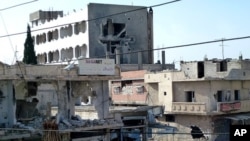Syrian government tanks and artillery pounded the Damascus suburb of Douma Wednesday, as an almost two-week old cease-fire continues to unravel. Four more U.N. observers have also arrived in the Syrian capital, despite comments by international envoy Kofi Annan that prospects for the cease-fire working are "bleak."
Syrian security forces reportedly opened fire on a minibus at a checkpoint in Idlib province near the Turkish border Wednesday, killing four civilians.
Syrian government tanks have attacked several Damascus suburbs, including Douma, within the past 24 hours, amid intermittent shelling and mortar fire.
Syrian state TV says four more U.N. observers, two from China, one from Indonesia and one from Ghana, arrived to join an 11-member team already at work. Opposition activists complain that government troops have been attacking towns just after the U.N. observers visit them.
Syria says it reserves the right to attack what it calls "armed terrorists."
But U.N.-Arab League envoy Kofi Annan told the Security Council Tuesday that reported government attacks on Hama after the observers had visited on Monday were “totally unacceptable and reprehensible.”
Mr. Annan's spokesman, Ahmed Fawzi, told the council that the U.N. had reports that people who have spoken with the observers may be “harassed or even worse killed,” by the Syrian army or security forces. He said, however, that the cease-fire must be made to work. "We have used all the words in the dictionary: it's fragile, it's shaky, it's precarious, it's risky. But, it's all we have at the moment and it underscores the need to deploy our monitors as quickly as possible," he said.
In Damascus, Deputy Syrian Foreign Minister Faisal al Miqdad blamed Western and Arab countries for causing the failure of the cease-fire.
He says that some Western and Arab countries don't want the Annan plan to succeed and their leaders say it will fail because they hate Syria and want to see more bloodshed, so they arm terrorists and flout the Annan plan, while Syria is respecting all of its clauses.
Hilal Khashan, who teaches political science at the American University of Beirut, says the Syrian government is trying to crush the popular uprising with brute force. "The only language that the Syrian regime understands is the use of force. The regime feels that they have a holiday, that they are entitled to do the only thing they do best, (which) is the use of force, because there is no counter-force to deter them," he said.
Analyst Riad Kahwaji of the Institute for Near East and Gulf Military Analysis argues that the Syrian government feels it can act with impunity. "The Syrian regime is not willing to reconsider its policy of using the security solution for the current conflict and still very much believes that it can rely on its allies Iran and Russia to prevent an international intervention that could lead to the toppling of the regime," he said.
The United Nations estimates that more than 9,000 people have been killed in Syria's 13-month crackdown on the revolt, while activist groups put the death toll at more than 11,000.
| Join the conversation on our social journalism site - Middle East Voices. Follow our Middle East reports on Twitter and discuss them on our Facebook page. |




